Review of units 6--10
文档属性
| 名称 | Review of units 6--10 |
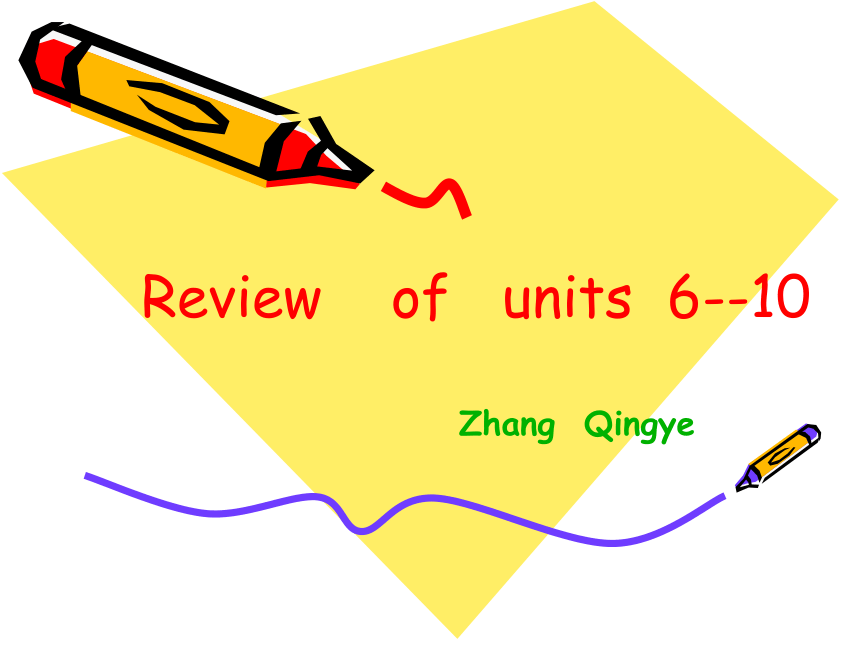
|
|
| 格式 | rar | ||
| 文件大小 | 195.8KB | ||
| 资源类型 | 教案 | ||
| 版本资源 | 人教新目标(Go for it)版 | ||
| 科目 | 英语 | ||
| 更新时间 | 2010-12-11 00:00:00 | ||
图片预览

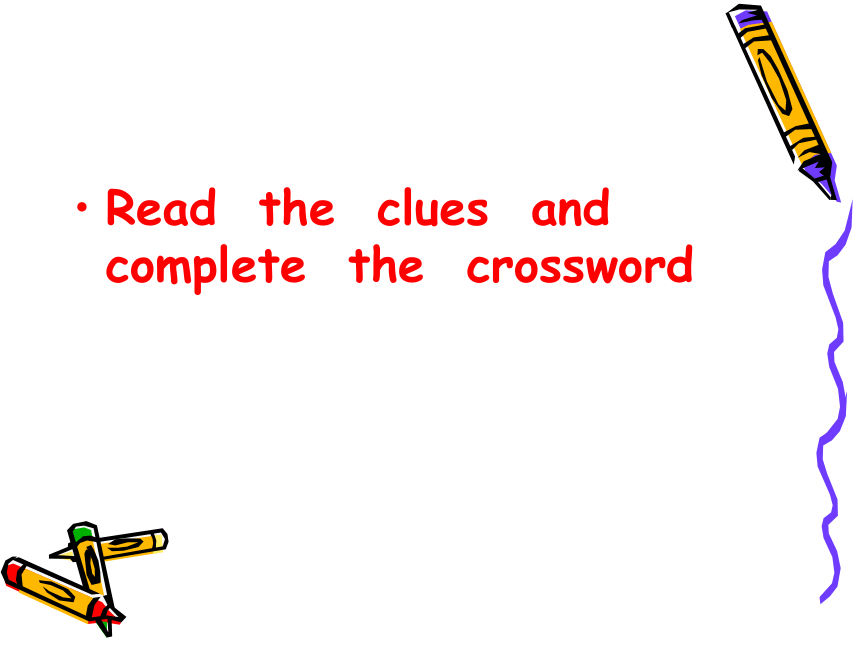
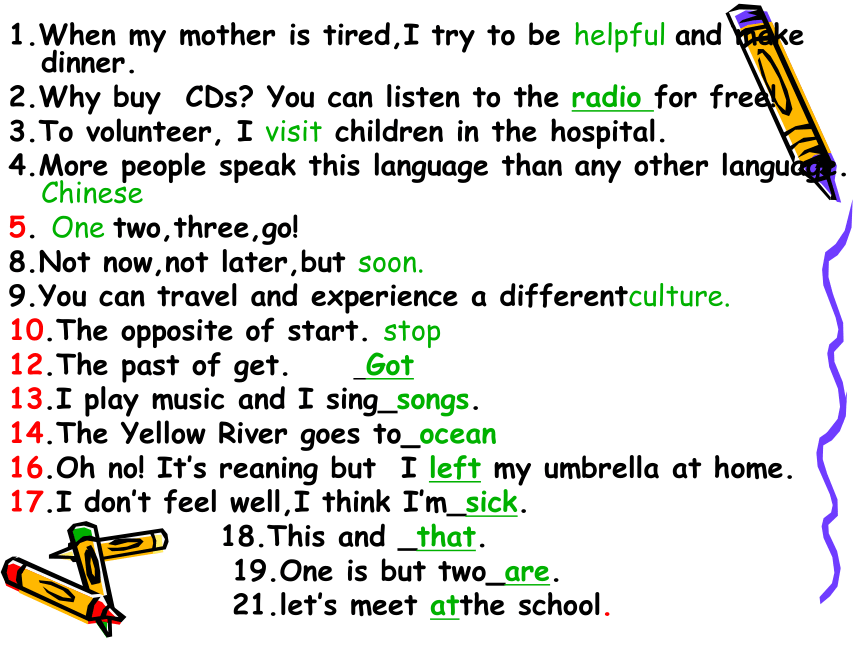
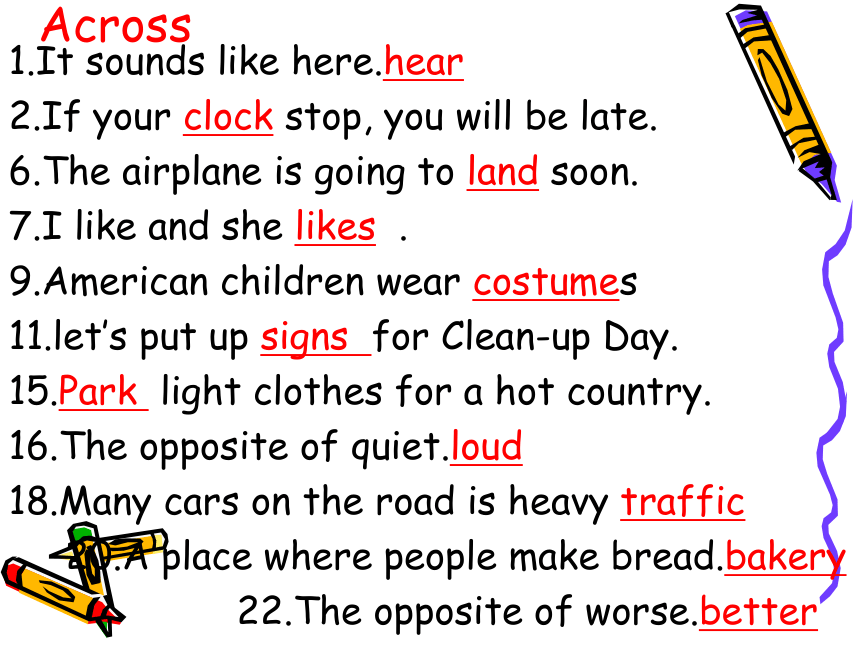
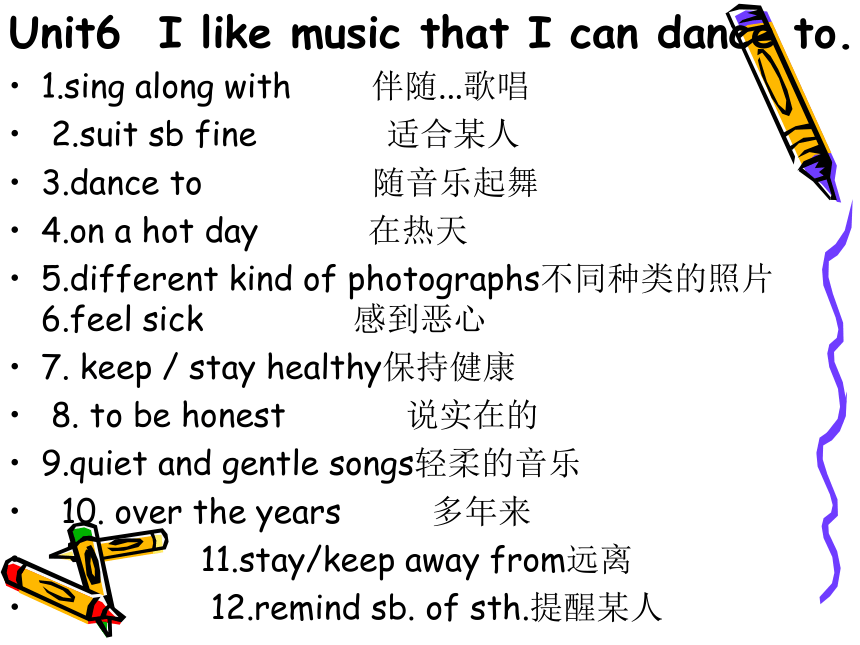
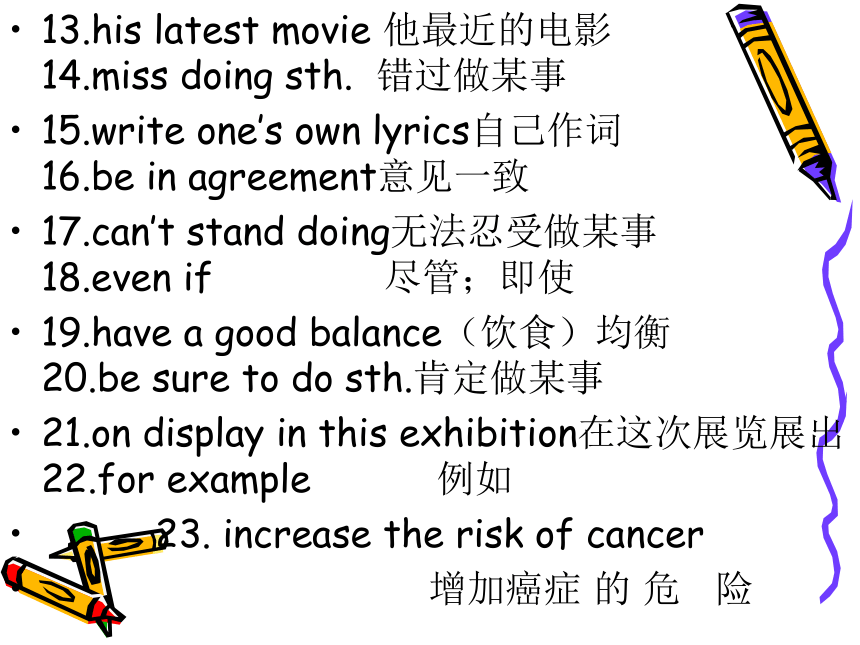
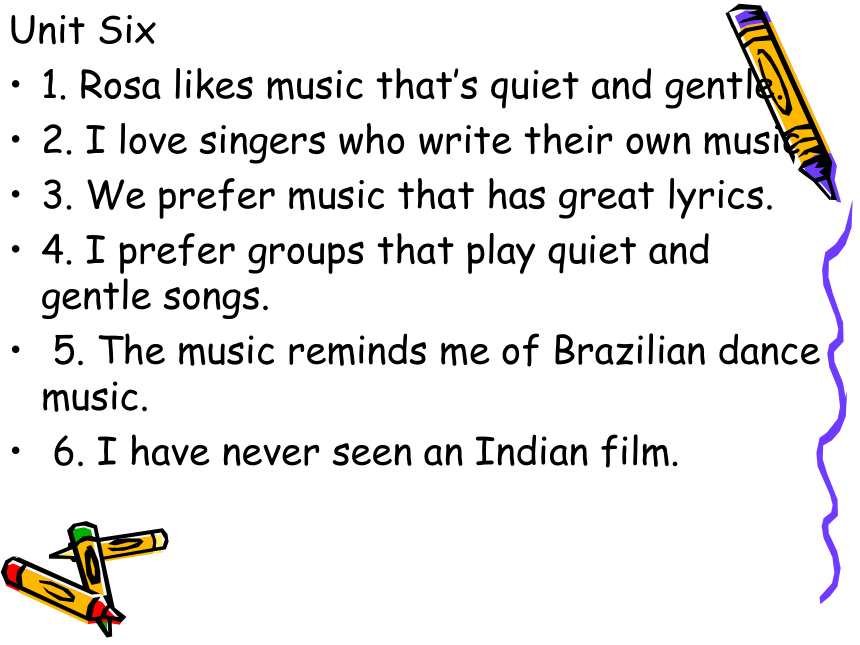
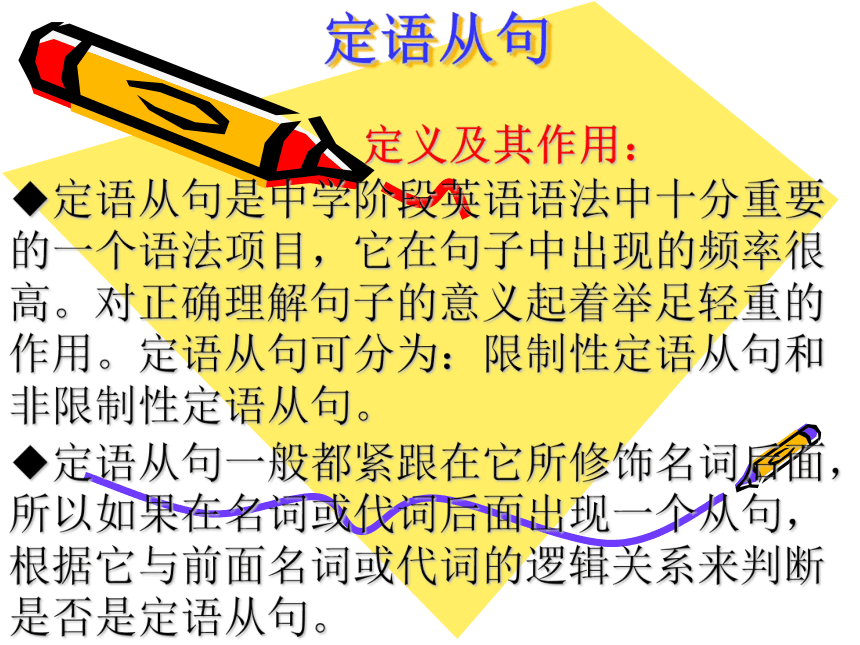


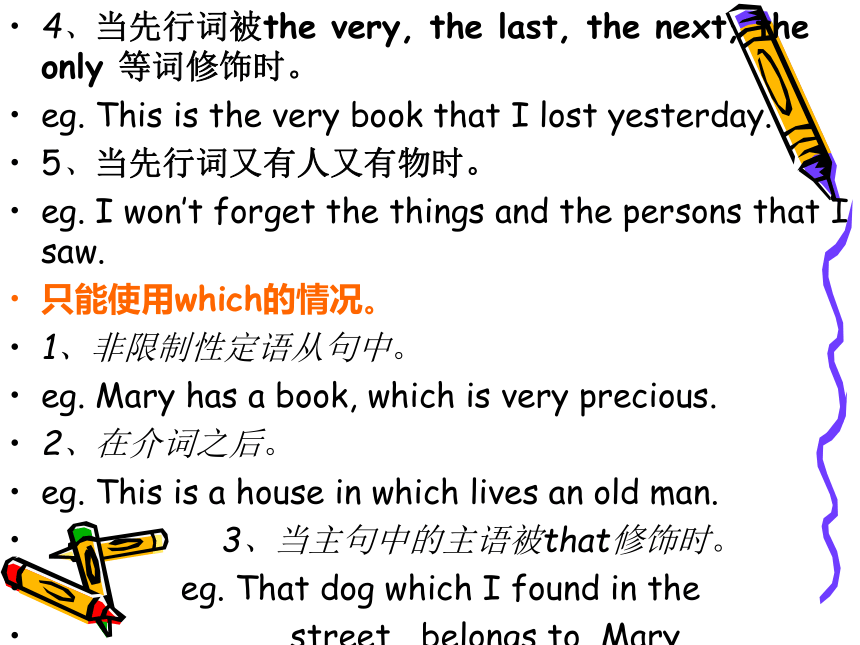

文档简介
课件48张PPT。Review of units 6--10Zhang QingyeRead the clues and complete the crossword
1.When my mother is tired,I try to be helpful and make dinner.
2.Why buy CDs? You can listen to the radio for free!
3.To volunteer, I visit children in the hospital.
4.More people speak this language than any other language. Chinese
5. One two,three,go!
8.Not now,not later,but soon.
9.You can travel and experience a differentculture.
10.The opposite of start. stop
12.The past of get. Got
13.I play music and I sing_songs.
14.The Yellow River goes to_ocean
16.Oh no! It’s reaning but I left my umbrella at home.
17.I don’t feel well,I think I’m_sick.
18.This and _that.
19.One is but two_are.
21.let’s meet atthe school.
Across1.It sounds like here.hear
2.If your clock stop, you will be late.
6.The airplane is going to land soon.
7.I like and she likes .
9.American children wear costumes
11.let’s put up signs for Clean-up Day.
15.Park light clothes for a hot country.
16.The opposite of quiet.loud
18.Many cars on the road is heavy traffic
20.A place where people make bread.bakery
22.The opposite of worse.betterUnit6 I like music that I can dance to.
1.sing along with 伴随...歌唱
2.suit sb fine 适合某人
3.dance to 随音乐起舞
4.on a hot day 在热天
5.different kind of photographs不同种类的照片 6.feel sick 感到恶心
7. keep / stay healthy保持健康
8. to be honest 说实在的
9.quiet and gentle songs轻柔的音乐
10. over the years 多年来
11.stay/keep away from远离
12.remind sb. of sth.提醒某人13.his latest movie 他最近的电影 14.miss doing sth. 错过做某事
15.write one’s own lyrics自己作词 16.be in agreement意见一致
17.can’t stand doing无法忍受做某事 18.even if 尽管;即使
19.have a good balance(饮食)均衡 20.be sure to do sth.肯定做某事
21.on display in this exhibition在这次展览展出 22.for example 例如
23. increase the risk of cancer
增加癌症 的 危 险
Unit Six
1. Rosa likes music that’s quiet and gentle.
2. I love singers who write their own music.
3. We prefer music that has great lyrics.
4. I prefer groups that play quiet and gentle songs.
5. The music reminds me of Brazilian dance music.
6. I have never seen an Indian film. 定语从句 定义及其作用:
定语从句是中学阶段英语语法中十分重要的一个语法项目,它在句子中出现的频率很高。对正确理解句子的意义起着举足轻重的作用。定语从句可分为:限制性定语从句和非限制性定语从句。
定语从句一般都紧跟在它所修饰名词后面,所以如果在名词或代词后面出现一个从句,根据它与前面名词或代词的逻辑关系来判断是否是定语从句。
先行词的作用
被定语从句所修饰的名词或 代词叫做“先行词”。引导定语从句的词叫“关系词”。关系词有两个作用:
一、引导定语从句
二、代替先行词在其引导的定语从句中充当一定的句子成份。
理解和牢记这两条概念,弄清楚关系词在定语从句中充当什么成分,是掌握定语从句的关键。修饰物体时关系代词that和 which的区分
使用that的情况:
1、当先行词是nothing, something, anything, all, each等不定代词时。
eg. Do you have anything that is important to tell me?
2、当先行词被all, any, some, no, not, every, each等修饰时。
eg. I have some books that are very good.
3、当先行词被形容词最高级、序数词所修饰时。
eg. This is the first book that I bought myself.
The biggest bird that I caught is this bird. 4、当先行词被the very, the last, the next, the only 等词修饰时。
eg. This is the very book that I lost yesterday.
5、当先行词又有人又有物时。
eg. I won’t forget the things and the persons that I saw.
只能使用which的情况。
1、非限制性定语从句中。
eg. Mary has a book, which is very precious.
2、在介词之后。
eg. This is a house in which lives an old man.
3、当主句中的主语被that修饰时。
eg. That dog which I found in the
street belongs to Mary.修饰人时关系代词that 和who, whom的区分。
当主句中的主语是who时,只能用that。
eg. Who is the girl that is standing over there?
关系代词whose既能修饰人,也能修饰物,在定语从句中充当定语,修饰先行词。
eg. She is the girl whose English sounds very beautiful.
Mary has a very good dog, whose hair turns out white and black. 关系代词as的用法及其与which的区别。
关系代词as在定语从句中指代整件事,充当句中的主语或者宾语,它经常和the same, such, as一起搭配使用,共同构成一个固定词组。
eg. As we all know, he is a famous scientist.
She has the same book as you have.关系副词when, where, why的用法以及与关系代词的区分。
关系副词在定语从句当中只能充当状语,当一个句子能够完整地表达一个意思时,我们就可以给这个句子加上特定的关系副词。
eg. I won’t forget the time when I got married.
Have you still remember the days when we stayed together?
This is the place where we had a good time.
Is this the house where Mr Smith lives?
I don’t know the reason why he won’t join us.
Do you know the reason why he didn’t come to
sweep the classroom?关系副词when, where和关系代词that, which的区分。同样是修饰一个地点,在从句中作地点状语用where,作宾语用that/which;同样是修饰一个时间,在从句状语用when, 在从句中作宾语用that/which。请比较以下句子:
This is the park that we visited last year.
This is the park where we held a birthday party.
She won’t forget the days that she spent on the island.
She won’t forget the days when they stayed together.
That’s the date __we went to the college.
That’s the date __ she won’t forget for ever.
I like the time when we lived together.
I like the time that we had together.
关系副词when, where, why 和介词+which之间的关系。关系副词when, where, why可以用适当的介词+which来替代。如:when=in/on/at…+which, where=in/on/at…+which, why=for+which介词的位置非常灵活,有时放在关系代词之前,有时放在动词之后。
eg. 1. I won’t forget the date when( on which) I was born.
2. This is the room where (in which) I lived. = This is the room which I lived in.
3. I don’t know the reason why (for which) he haven’t come today.
4. Tom still remembers the days when
(in which) they lived in Tianjin. Unit 7 Where would you like to visit?
1.go on vacation 去度假
2. trek through the jungle在热带丛林中跋涉
3.some day /one day有一天
4. thousands of translators 数千(万)的翻译员
5.quite a few颇多的
6. take it easy从容,轻松
7.travel around 观光,到处走动
8. provide sb. with sth. 向某人提供
9.hold on to sth.坚定
10. provide sth. for sb.
11.in general通常,大体
12. come true实现13.as soon as possible尽快地
14.in order to以便,为了
15.consider doing sth.考虑做某事
16.somewhere fascinating某个迷人的地方
17.fantastic sights极妙的风景
18.quite an expensive hotel一个相当昂贵的酒店
19.continue doing sth.继续做某事
20.be willing to do sth.乐意做某事.
21.according to根据
22.be away for three weeks离开三周
23.in the east of China 在中国的东部
24.sail across the Pacific驾船横渡太平洋
25.dream about / of 梦见/梦想
26.take part in参加
27.one of the most famous churches in the world
世界上最著名的教堂之一 Unit Seven
1. A: Where would you like to visit?
B: I’d like to go somewhere relaxing.
2. A: Where would you like to visit?
B: I hope to go to France some day.
3. A: Where would you like to visit?
B: I’d love to visit Mexico.
4. That would be wonderful.
5. But there’s not much to do there.
6. Living in Singapore is quite expensive.
7. It’s also a wonderful place for shopping.
8. My family and I want to take a trip. Grammar (表达意愿)1. would like +名词(代词)“想要某物”I’d like some hamburgers. The cake is delicious. Would you like one?would like to do sth.想要/愿意做某事I’d like to visit London.Would you like to go?Yes, please.No, thanks.I`d love/like to/OK/Sure/Certainly.I`d love/like to/Sorry. But …
hope 的用法:
hope to do sth. 希望去做某事
hope that +宾语从句 希望……
不能说hope sb. to do sth.
wish的用法:
wish to do sth.希望做某事
wish sb. to do sth.希望某人做某事
wish that +虚拟语气Unit 8 I’ll help to clean up the city parks.
1.cheer up 使振奋、高兴
2.clean up 打扫干净
3. Clean-up Day 清洁日
4. put up signs 搭建,张贴标牌
5. come up with 提出(问题),想出=think up 6. fix up 修理
7. set up建立,创办
8. call up打电话
9. give away 赠送,分发
10. hand out 分发,发放
11. give out 发放,分发
12. work out 制定出,算出13. help out 帮助(某人)摆脱困境
14. run out of 耗尽,用光
15. put sth. to good use 很好地利用…
16. try to do sth. 尽力做某事
17. plan to do sth. 计划做某事
18. be similar to 与…相似
19. not only...but also 不但…而且…
20. write down 写下, 记下
21. take after 与…相像
22.not... any more 不再
23. ask for 要求、索要
24. put off推迟,拖延
Unit Eight
1. He looks sad. Let’s cheer him up.
2. We’re going to set up a food bank to help hungry people.
3. We need to come up with some ideas.
4. We can’t put off making a plan.
5. You could volunteer in an after-school study program.
6. I take after my father.
7. Your parents must be proud of you.
8. I need to come up with some ways of
getting money. 动词短语
1.“动词+副词”
常见短语:give back, put off, find out, turn on, turn off, turn on, take off, give up, pick up, write down,
宾代副前,宾名副前后
2. “动词+介词”
常见短语:look for, look after,
send for, worry about,
wait for, hear fromUnit 9 When was it invented?
1. be used for 被用来做…
2. be used to doing sth. 习惯于做某事
3. according to 根据,按照
4. in this way 这样
5. help sb. do sth. 帮助某人做某事
6. by accident 偶然的
7.by mistake 错误的
8. in the end= at last=finally 最后 9. make the customer happy使顾客开心
10.fall into 落入,陷入
11. a chef called Black一个叫布莱克的厨师
12. sprinkle a lot of salt on chips
在薯片上洒大量的盐
13. decide to do sth.决定做某事14. not…until 直到…才
15. over three thousand years三千年以上
16. produce a pleasant smell产生一股令人愉快的气味
17. over an open fire. 在明火上
18.at college 在大学
19. in nineteenth century在十九世纪
20.light bulb 电灯泡
21.flying disk 飞盘
22.microwave oven微波炉
23.knock into 撞上(某人)
24. taste salty 尝起来很咸
25.divide…into 把…分为…
26.the number of …的数量
27.an ancient Chinese legend
一个中国古代传说
Unit Nine
1. A: When was the car invented?
B: It was invented in 1885.
2. A: When were the electric slippers invented?
B: They were invented last year.
3. A: Who were they invented by?
B: They were invented by Julie Thompson.
4. A: What are they used for?
B: They’re used for seeing in the dark.
5. Some friends of mine had one TV set.
6. In this way, one of the world’s favorite
drinks was invented.The passive voice.被动语态 英语中动词有主动语态和被动语态两种语态. 主动语
态表示主语是动作的执行者,被动语态表示主语是动作的
承受者, 在被动语态中动作的执行者有时用by短语表示
出来.被动语态的构成:助动词be+ (及物动词的) 过去分词 一般现在时一般过去时一般现在时: am / is / are done
一般过去时: was / were done
现在进行时: am / is / are being done
过去进行时: was / were being done
现在完成时: have / has been done
过去完成时: had been done
一般将来时: shall / will be done ;
be going to be done
当句中含有情态动词时,句子结构为 can / must / have to…be doneThe passive voice.被动语态主动语态变被动语态的结构图:Bell invented the telephone in 1876.
The telephone was invented by Bell in 1876. 主语谓语动词过去时宾语时间状语主语谓语动词的过去分词宾语时间状语1带复合宾语的被动语态结构.(1)make sb. do sth. sb. be made to do sth.Mr Green made Jim do his homework at home.Jim was made to do his homework by Mr Green at home.watch let have
hear see noticeBob sent Kate a letter last year.=Kate was sent a letter by Bob last year.=A letter was sent to Kate by Bob last year.tell ask bring write
give teach pass lend…toHe told Jim a story.Mum made me a new dress.I was made a new dress by Mum.
A new dress was made for me by Mum.make
buy
draw…forI bought my brother a book.注意:约翰打开了收音机。John turned on the radio.The radio was turned on.奶奶照看我姐姐。Grandma takes care of my sister.My sister is taken care of by Grandma.注:千万不要遗漏介词或副词。We must speak to old people politely.Old people must be spoken to politely.They said that he would come back soon.It was said that he would come back soon.类似的还有: It is reported /
believed /
hoped /
supposed that ......We report 1). 不及物动词没有被动语态。 如:belong, happen, take place, last, come true, remain, succeed, fall, die, arrive, 等。 * Great changes have taken place in this city. * That bike doesn’t belong to Mike. 不用被动语态的几种情况:不用被动语态的几种情况:2) 表示静态的及物动词不用被动语态have / fitI have a TV set.The coat fits me well.3)祈使句一般没有被动语态。
【正】Look at the blackboard,please.
【误】The blackboard is looked at by you. 不用被动语态的几种情况:4.系动词没有被动态和进行时态这鱼味道很好。这条围巾摸上去很软。The fish tastes good.The scarf feels soft.5.反身代词在句中作宾语时,不能用被动语态。例如:
【正】You must look after yourself.
【误】Yourself must be looked after 4.某些动词形式是主动,但含有被动的意思。这书很好卖。这种布很好洗。The book sells well.This kind of cloth washes very well.这书卖完了。The book is sold out.Unit10
1.by the time 到…时候为止
2.get outside 到外边
3.get into the shower 去洗澡
4.start doing / to do sth. 开始做某事
5.be late for 迟到
6.go off (闹钟)闹响
7.wake up 醒来
8.come out 出来,出现
9.run off 迅速离开,跑掉
10.on time 准时
11.in time 及时
12.come by (走)过来
13.give sb. a ride 让某人搭车
14.break down 损坏,坏掉15.show up 出席,露面
16sth. happen to sb. 某事发生在某人身上
17.stay up 熬夜
18.wait for sb. to do sth.等某人做某事
19.so …that … 如此…以至于
20.set off 出发,开始
21.April Fool‘s Day 愚人节
22.a costume party 一个化装舞会
23.get married 结婚
24.marry sb. 与某人结婚
25.get dressed 穿好衣服
26.on the first day 在第一天
27.make it成功了,做成了
28. sold out卖完,售光
Unit Ten
1. By the time she got up, her brother had already gone into the bathroom.
2. By the time she went outside, the bus had already gone.
3. By the time she got to class, the teacher had already started teaching.
4. When she got to school, she realized she had left her backpack at home.
5. I don’t want to stay up too late. The Past Perfect Tense 过去完成时过去完成时的构成
助动词 had (用于各种人称和数) + 过去分词When I got to school, the bell had rung.2. 过去完成时的用法:
主要是表示在过去某个时间,或是动作之前
已经发生或完成的动作.也就是过去的过去.The Past Perfect Tense 过去完成时3. 常用的几种方式:
用介词by, before 等构成的时间短语.
用连词when, before, after或者短语by the time
引导的时间状语从句.We had learnt 20 English songs by the end
of last month.
The plane had taken off when I reached the
airport.
By the time I got up , my brother had left home.
Thank you!Bye-bye
1.When my mother is tired,I try to be helpful and make dinner.
2.Why buy CDs? You can listen to the radio for free!
3.To volunteer, I visit children in the hospital.
4.More people speak this language than any other language. Chinese
5. One two,three,go!
8.Not now,not later,but soon.
9.You can travel and experience a differentculture.
10.The opposite of start. stop
12.The past of get. Got
13.I play music and I sing_songs.
14.The Yellow River goes to_ocean
16.Oh no! It’s reaning but I left my umbrella at home.
17.I don’t feel well,I think I’m_sick.
18.This and _that.
19.One is but two_are.
21.let’s meet atthe school.
Across1.It sounds like here.hear
2.If your clock stop, you will be late.
6.The airplane is going to land soon.
7.I like and she likes .
9.American children wear costumes
11.let’s put up signs for Clean-up Day.
15.Park light clothes for a hot country.
16.The opposite of quiet.loud
18.Many cars on the road is heavy traffic
20.A place where people make bread.bakery
22.The opposite of worse.betterUnit6 I like music that I can dance to.
1.sing along with 伴随...歌唱
2.suit sb fine 适合某人
3.dance to 随音乐起舞
4.on a hot day 在热天
5.different kind of photographs不同种类的照片 6.feel sick 感到恶心
7. keep / stay healthy保持健康
8. to be honest 说实在的
9.quiet and gentle songs轻柔的音乐
10. over the years 多年来
11.stay/keep away from远离
12.remind sb. of sth.提醒某人13.his latest movie 他最近的电影 14.miss doing sth. 错过做某事
15.write one’s own lyrics自己作词 16.be in agreement意见一致
17.can’t stand doing无法忍受做某事 18.even if 尽管;即使
19.have a good balance(饮食)均衡 20.be sure to do sth.肯定做某事
21.on display in this exhibition在这次展览展出 22.for example 例如
23. increase the risk of cancer
增加癌症 的 危 险
Unit Six
1. Rosa likes music that’s quiet and gentle.
2. I love singers who write their own music.
3. We prefer music that has great lyrics.
4. I prefer groups that play quiet and gentle songs.
5. The music reminds me of Brazilian dance music.
6. I have never seen an Indian film. 定语从句 定义及其作用:
定语从句是中学阶段英语语法中十分重要的一个语法项目,它在句子中出现的频率很高。对正确理解句子的意义起着举足轻重的作用。定语从句可分为:限制性定语从句和非限制性定语从句。
定语从句一般都紧跟在它所修饰名词后面,所以如果在名词或代词后面出现一个从句,根据它与前面名词或代词的逻辑关系来判断是否是定语从句。
先行词的作用
被定语从句所修饰的名词或 代词叫做“先行词”。引导定语从句的词叫“关系词”。关系词有两个作用:
一、引导定语从句
二、代替先行词在其引导的定语从句中充当一定的句子成份。
理解和牢记这两条概念,弄清楚关系词在定语从句中充当什么成分,是掌握定语从句的关键。修饰物体时关系代词that和 which的区分
使用that的情况:
1、当先行词是nothing, something, anything, all, each等不定代词时。
eg. Do you have anything that is important to tell me?
2、当先行词被all, any, some, no, not, every, each等修饰时。
eg. I have some books that are very good.
3、当先行词被形容词最高级、序数词所修饰时。
eg. This is the first book that I bought myself.
The biggest bird that I caught is this bird. 4、当先行词被the very, the last, the next, the only 等词修饰时。
eg. This is the very book that I lost yesterday.
5、当先行词又有人又有物时。
eg. I won’t forget the things and the persons that I saw.
只能使用which的情况。
1、非限制性定语从句中。
eg. Mary has a book, which is very precious.
2、在介词之后。
eg. This is a house in which lives an old man.
3、当主句中的主语被that修饰时。
eg. That dog which I found in the
street belongs to Mary.修饰人时关系代词that 和who, whom的区分。
当主句中的主语是who时,只能用that。
eg. Who is the girl that is standing over there?
关系代词whose既能修饰人,也能修饰物,在定语从句中充当定语,修饰先行词。
eg. She is the girl whose English sounds very beautiful.
Mary has a very good dog, whose hair turns out white and black. 关系代词as的用法及其与which的区别。
关系代词as在定语从句中指代整件事,充当句中的主语或者宾语,它经常和the same, such, as一起搭配使用,共同构成一个固定词组。
eg. As we all know, he is a famous scientist.
She has the same book as you have.关系副词when, where, why的用法以及与关系代词的区分。
关系副词在定语从句当中只能充当状语,当一个句子能够完整地表达一个意思时,我们就可以给这个句子加上特定的关系副词。
eg. I won’t forget the time when I got married.
Have you still remember the days when we stayed together?
This is the place where we had a good time.
Is this the house where Mr Smith lives?
I don’t know the reason why he won’t join us.
Do you know the reason why he didn’t come to
sweep the classroom?关系副词when, where和关系代词that, which的区分。同样是修饰一个地点,在从句中作地点状语用where,作宾语用that/which;同样是修饰一个时间,在从句状语用when, 在从句中作宾语用that/which。请比较以下句子:
This is the park that we visited last year.
This is the park where we held a birthday party.
She won’t forget the days that she spent on the island.
She won’t forget the days when they stayed together.
That’s the date __we went to the college.
That’s the date __ she won’t forget for ever.
I like the time when we lived together.
I like the time that we had together.
关系副词when, where, why 和介词+which之间的关系。关系副词when, where, why可以用适当的介词+which来替代。如:when=in/on/at…+which, where=in/on/at…+which, why=for+which介词的位置非常灵活,有时放在关系代词之前,有时放在动词之后。
eg. 1. I won’t forget the date when( on which) I was born.
2. This is the room where (in which) I lived. = This is the room which I lived in.
3. I don’t know the reason why (for which) he haven’t come today.
4. Tom still remembers the days when
(in which) they lived in Tianjin. Unit 7 Where would you like to visit?
1.go on vacation 去度假
2. trek through the jungle在热带丛林中跋涉
3.some day /one day有一天
4. thousands of translators 数千(万)的翻译员
5.quite a few颇多的
6. take it easy从容,轻松
7.travel around 观光,到处走动
8. provide sb. with sth. 向某人提供
9.hold on to sth.坚定
10. provide sth. for sb.
11.in general通常,大体
12. come true实现13.as soon as possible尽快地
14.in order to以便,为了
15.consider doing sth.考虑做某事
16.somewhere fascinating某个迷人的地方
17.fantastic sights极妙的风景
18.quite an expensive hotel一个相当昂贵的酒店
19.continue doing sth.继续做某事
20.be willing to do sth.乐意做某事.
21.according to根据
22.be away for three weeks离开三周
23.in the east of China 在中国的东部
24.sail across the Pacific驾船横渡太平洋
25.dream about / of 梦见/梦想
26.take part in参加
27.one of the most famous churches in the world
世界上最著名的教堂之一 Unit Seven
1. A: Where would you like to visit?
B: I’d like to go somewhere relaxing.
2. A: Where would you like to visit?
B: I hope to go to France some day.
3. A: Where would you like to visit?
B: I’d love to visit Mexico.
4. That would be wonderful.
5. But there’s not much to do there.
6. Living in Singapore is quite expensive.
7. It’s also a wonderful place for shopping.
8. My family and I want to take a trip. Grammar (表达意愿)1. would like +名词(代词)“想要某物”I’d like some hamburgers. The cake is delicious. Would you like one?would like to do sth.想要/愿意做某事I’d like to visit London.Would you like to go?Yes, please.No, thanks.I`d love/like to/OK/Sure/Certainly.I`d love/like to/Sorry. But …
hope 的用法:
hope to do sth. 希望去做某事
hope that +宾语从句 希望……
不能说hope sb. to do sth.
wish的用法:
wish to do sth.希望做某事
wish sb. to do sth.希望某人做某事
wish that +虚拟语气Unit 8 I’ll help to clean up the city parks.
1.cheer up 使振奋、高兴
2.clean up 打扫干净
3. Clean-up Day 清洁日
4. put up signs 搭建,张贴标牌
5. come up with 提出(问题),想出=think up 6. fix up 修理
7. set up建立,创办
8. call up打电话
9. give away 赠送,分发
10. hand out 分发,发放
11. give out 发放,分发
12. work out 制定出,算出13. help out 帮助(某人)摆脱困境
14. run out of 耗尽,用光
15. put sth. to good use 很好地利用…
16. try to do sth. 尽力做某事
17. plan to do sth. 计划做某事
18. be similar to 与…相似
19. not only...but also 不但…而且…
20. write down 写下, 记下
21. take after 与…相像
22.not... any more 不再
23. ask for 要求、索要
24. put off推迟,拖延
Unit Eight
1. He looks sad. Let’s cheer him up.
2. We’re going to set up a food bank to help hungry people.
3. We need to come up with some ideas.
4. We can’t put off making a plan.
5. You could volunteer in an after-school study program.
6. I take after my father.
7. Your parents must be proud of you.
8. I need to come up with some ways of
getting money. 动词短语
1.“动词+副词”
常见短语:give back, put off, find out, turn on, turn off, turn on, take off, give up, pick up, write down,
宾代副前,宾名副前后
2. “动词+介词”
常见短语:look for, look after,
send for, worry about,
wait for, hear fromUnit 9 When was it invented?
1. be used for 被用来做…
2. be used to doing sth. 习惯于做某事
3. according to 根据,按照
4. in this way 这样
5. help sb. do sth. 帮助某人做某事
6. by accident 偶然的
7.by mistake 错误的
8. in the end= at last=finally 最后 9. make the customer happy使顾客开心
10.fall into 落入,陷入
11. a chef called Black一个叫布莱克的厨师
12. sprinkle a lot of salt on chips
在薯片上洒大量的盐
13. decide to do sth.决定做某事14. not…until 直到…才
15. over three thousand years三千年以上
16. produce a pleasant smell产生一股令人愉快的气味
17. over an open fire. 在明火上
18.at college 在大学
19. in nineteenth century在十九世纪
20.light bulb 电灯泡
21.flying disk 飞盘
22.microwave oven微波炉
23.knock into 撞上(某人)
24. taste salty 尝起来很咸
25.divide…into 把…分为…
26.the number of …的数量
27.an ancient Chinese legend
一个中国古代传说
Unit Nine
1. A: When was the car invented?
B: It was invented in 1885.
2. A: When were the electric slippers invented?
B: They were invented last year.
3. A: Who were they invented by?
B: They were invented by Julie Thompson.
4. A: What are they used for?
B: They’re used for seeing in the dark.
5. Some friends of mine had one TV set.
6. In this way, one of the world’s favorite
drinks was invented.The passive voice.被动语态 英语中动词有主动语态和被动语态两种语态. 主动语
态表示主语是动作的执行者,被动语态表示主语是动作的
承受者, 在被动语态中动作的执行者有时用by短语表示
出来.被动语态的构成:助动词be+ (及物动词的) 过去分词 一般现在时一般过去时一般现在时: am / is / are done
一般过去时: was / were done
现在进行时: am / is / are being done
过去进行时: was / were being done
现在完成时: have / has been done
过去完成时: had been done
一般将来时: shall / will be done ;
be going to be done
当句中含有情态动词时,句子结构为 can / must / have to…be doneThe passive voice.被动语态主动语态变被动语态的结构图:Bell invented the telephone in 1876.
The telephone was invented by Bell in 1876. 主语谓语动词过去时宾语时间状语主语谓语动词的过去分词宾语时间状语1带复合宾语的被动语态结构.(1)make sb. do sth. sb. be made to do sth.Mr Green made Jim do his homework at home.Jim was made to do his homework by Mr Green at home.watch let have
hear see noticeBob sent Kate a letter last year.=Kate was sent a letter by Bob last year.=A letter was sent to Kate by Bob last year.tell ask bring write
give teach pass lend…toHe told Jim a story.Mum made me a new dress.I was made a new dress by Mum.
A new dress was made for me by Mum.make
buy
draw…forI bought my brother a book.注意:约翰打开了收音机。John turned on the radio.The radio was turned on.奶奶照看我姐姐。Grandma takes care of my sister.My sister is taken care of by Grandma.注:千万不要遗漏介词或副词。We must speak to old people politely.Old people must be spoken to politely.They said that he would come back soon.It was said that he would come back soon.类似的还有: It is reported /
believed /
hoped /
supposed that ......We report 1). 不及物动词没有被动语态。 如:belong, happen, take place, last, come true, remain, succeed, fall, die, arrive, 等。 * Great changes have taken place in this city. * That bike doesn’t belong to Mike. 不用被动语态的几种情况:不用被动语态的几种情况:2) 表示静态的及物动词不用被动语态have / fitI have a TV set.The coat fits me well.3)祈使句一般没有被动语态。
【正】Look at the blackboard,please.
【误】The blackboard is looked at by you. 不用被动语态的几种情况:4.系动词没有被动态和进行时态这鱼味道很好。这条围巾摸上去很软。The fish tastes good.The scarf feels soft.5.反身代词在句中作宾语时,不能用被动语态。例如:
【正】You must look after yourself.
【误】Yourself must be looked after 4.某些动词形式是主动,但含有被动的意思。这书很好卖。这种布很好洗。The book sells well.This kind of cloth washes very well.这书卖完了。The book is sold out.Unit10
1.by the time 到…时候为止
2.get outside 到外边
3.get into the shower 去洗澡
4.start doing / to do sth. 开始做某事
5.be late for 迟到
6.go off (闹钟)闹响
7.wake up 醒来
8.come out 出来,出现
9.run off 迅速离开,跑掉
10.on time 准时
11.in time 及时
12.come by (走)过来
13.give sb. a ride 让某人搭车
14.break down 损坏,坏掉15.show up 出席,露面
16sth. happen to sb. 某事发生在某人身上
17.stay up 熬夜
18.wait for sb. to do sth.等某人做某事
19.so …that … 如此…以至于
20.set off 出发,开始
21.April Fool‘s Day 愚人节
22.a costume party 一个化装舞会
23.get married 结婚
24.marry sb. 与某人结婚
25.get dressed 穿好衣服
26.on the first day 在第一天
27.make it成功了,做成了
28. sold out卖完,售光
Unit Ten
1. By the time she got up, her brother had already gone into the bathroom.
2. By the time she went outside, the bus had already gone.
3. By the time she got to class, the teacher had already started teaching.
4. When she got to school, she realized she had left her backpack at home.
5. I don’t want to stay up too late. The Past Perfect Tense 过去完成时过去完成时的构成
助动词 had (用于各种人称和数) + 过去分词When I got to school, the bell had rung.2. 过去完成时的用法:
主要是表示在过去某个时间,或是动作之前
已经发生或完成的动作.也就是过去的过去.The Past Perfect Tense 过去完成时3. 常用的几种方式:
用介词by, before 等构成的时间短语.
用连词when, before, after或者短语by the time
引导的时间状语从句.We had learnt 20 English songs by the end
of last month.
The plane had taken off when I reached the
airport.
By the time I got up , my brother had left home.
Thank you!Bye-bye
同课章节目录
- Unit 1 How can we become good learners.
- Section A
- Section B
- Unit 2 I think that mooncakes are delicious!
- Section A
- Section B
- Unit 3 Could you please tell me where the restroom
- Section A
- Section B
- Unit 4 I used to be afraid of the dark.
- Section A
- Section B
- Unit 5 What are the shirts made of?
- Section A
- Section B
- Review of Units 1-5
- Unit 6 When was it invented?
- Section A
- Section B
- Unit 7 Teenagers should be allowed to choose their
- Section A
- Section B
- Unit 8 It must belong to Carla.
- Section A
- Section B
- Unit 9 I like music that I can dance to.
- Section A
- Section B
- Unit 10 You're supposed to shake hands.
- Section A
- Section B
- Review of Units 6-10
- Unit 11 Sad movies make me cry.
- Section A
- Section B
- Unit 12 Life is full of the unexpected
- Section A
- Section B
- Unit 13 We're trying to save the earth!
- Section A
- Section B
- Unit 14 I remember meeting all of you in Grade 7.
- Section A
- Section B
- Review of Units 11-14
